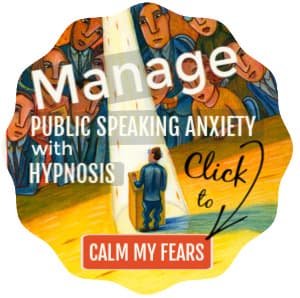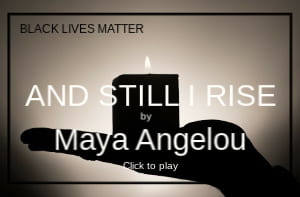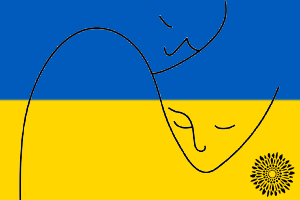- HOME ›
- Speech topics ›
- Easter speech topics
Easter speeches: 30+ speech topic ideas
Easter celebrations across centuries, countries & cultures
By: Susan Dugdale
Easter is a time of rebirth, renewal, and depending on where you are in the world, the arrival of spring. Whether you're preparing speeches for a class, a community event, or simply seeking inspiration, this article offers a diverse range of Easter speech topics, going beyond the typical Easter bunny.
Discover fascinating historical insights, explore global customs, and even learn how to create delicious demonstration speeches – perfect for middle school and beyond!☺
Finding the perfect topic is key to a captivating speech. I've included go-to links to help you kickstart your research and discover which topic truly sparks your interest. These resources include both secular and religious perspectives, offering a well-rounded view of this multifaceted holiday.
History and origins of Easter
The essence of Easter (rebirth and renewal) has been celebrated in many forms by many cultures throughout the centuries. Because of its universality there is considerable ongoing debate over its exact origin and the traditions associated with it.
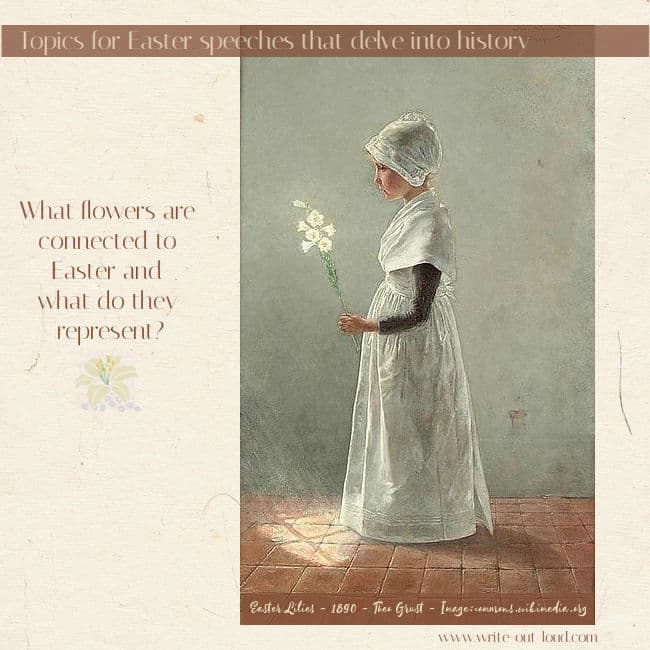
1.The etymology of Easter: where does the word "Easter" come from?
Explore its pre-Christian roots and connection to the Saxon goddess Eostre. Delve into the fascinating linguistic history and evolution of this springtime celebration.
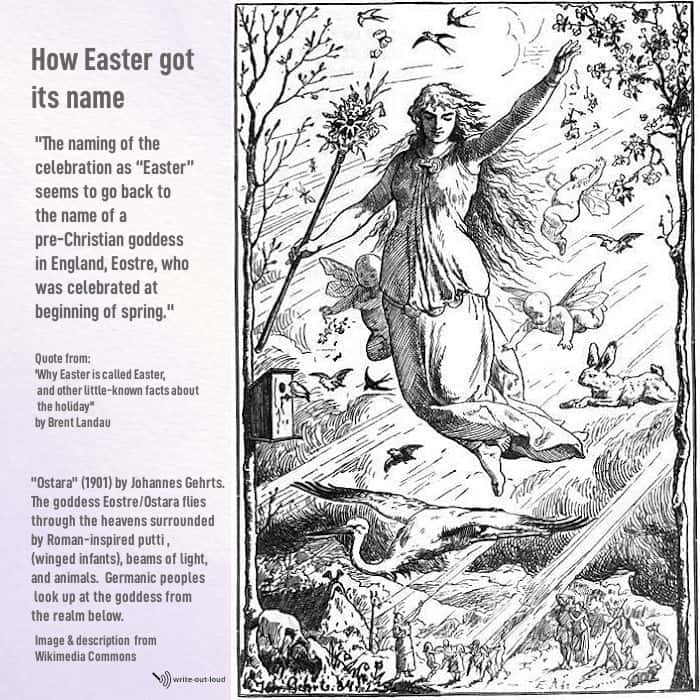
For more read Brent Landau's article: Why Easter is called Easter, and other little-known facts about the holiday
2.What is the story behind the Easter rabbit?
Hop into the history of the Easter Bunny! Is it linked to the goddess Eostre? Trace its journey from European folklore to its widespread adoption in America.
This Wikipedia page is a good starting point for information on the history of Easter Bunny.
3.The shifting dates of Easter. Why they change from year to year?
Unlike Christmas, Easter's date changes annually. Find out about the astronomical calculations and historical debates behind this fluctuating holiday.
BBC Religious affairs correspondent, Caroline Wyatt explains why the dates of Easter can't be fixed.
4.Lent: a period of reflection
Explore the history and purpose of Lent. What are its origins, and how is it observed by Christians worldwide? Discuss the various traditions of fasting, prayer, and reflection associated with this 40-day period leading up to Easter.
Check this Wikipedia link for a good introductory overview: Lent.
5.Connecting Passover and Easter
Discover the shared themes and historical connections between the Jewish festival of Passover and Christian Easter. Delve into the symbolism of liberation, renewal, and the triumph of life over death.
Rabbi Daniel F Polish looks at the similarities between them is his article: Easter and Passover have more in common than you think for American Magazine.
6.Passion plays: dramatic retellings of Christ's story
Dig into the history and significance of Passion Plays, dramatic performances depicting the suffering, death, and resurrection of Jesus Christ.
They began during the medieval period when the majority of people could not read or write. Telling the story in the form of a play was the most effective way of sharing it.
Oberammergau, in Germany's Bavarian Alps, is famous for its annual passion play production. It's a tradition that began 1634 and draws visitors from all over the world.
Passion plays are also performed throughout USA, in the United Kingdom, Australia, Italy, Brazil, Mexico, Canada, Hungary, Malta, The Netherlands, The Philippines and many other countries.
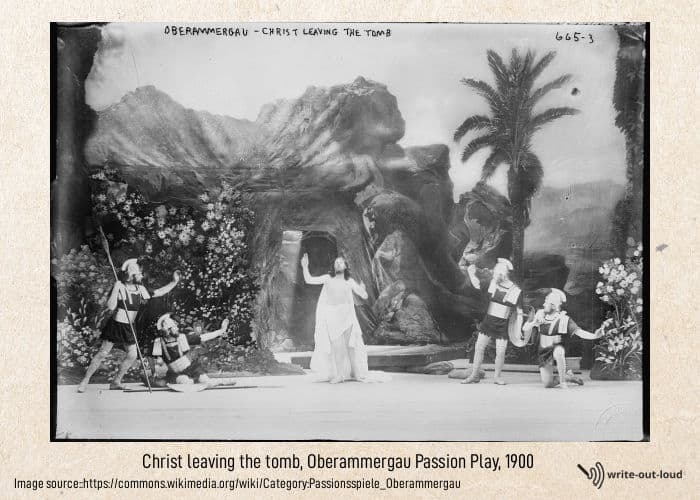
This Britannica link is a good starting point to look into the topic: Passion plays.
For more images, similar to the one above, see: Category: Passion plays - Wikimedia Commons
The symbols and traditions associated with Easter
7.What special significance do candles have at Easter?
Christians celebrate the light of Christ coming into the world by lighting a Paschal candle. Its flame represents the risen Christ - a light to dispel darkness.
To find out more read this comprehensive article: From Darkness to Light - The Paschal Candle, Everything You Need to Know from www.zieglers.com. According to them the Paschal Candle is one of the most sacred and enduring elements in Christianity.
8.What colors are associated with Easter and what do they stand for?
Purple represents royalty and spiritual wealth. White symbolizes purity and grace. What about gold, red, green, pink or black?
Here's an introductory article from southernliving.com on The Real Meanings Behind the Colors of Easter.
9.Spring Flowers and their symbolism
I have always loved Easter lilies and the way their perfume fills a room. Then there's daffodils, tulips, iris and daisies too! So many beautiful Spring flowers and all of them are associated with Easter. Explore the language of flowers at Easter.
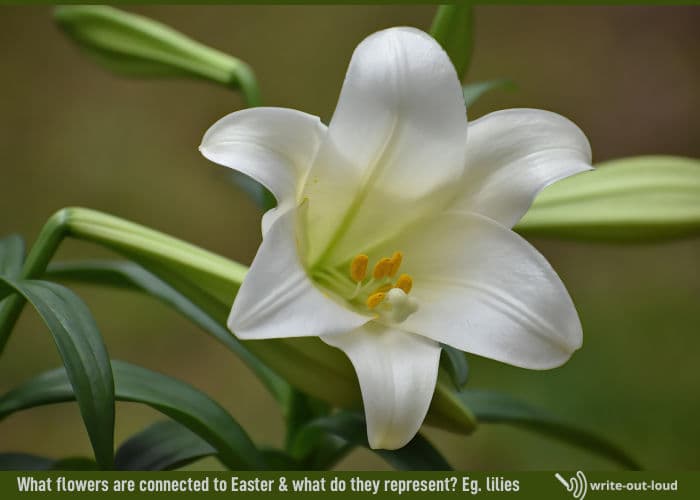
Try this explanation on the symbolism and significance of the Easter lily as an introduction to the topic.
10. What does Spring symbolize? How is it a mirror of the resurrection?
Delve into the symbolic connections between springtime and the concept of resurrection. Use quotations from poets, theologians, and other figures to explore the shared themes of rebirth, renewal, and the triumph of life over death.
There are literally hundreds of them. Some are secular. Some are religious.
Many, like this one from Chilean poet Pablo Neruda, refer to the death-defying cycle of life. The seasons will roll around and Spring will come regardless of whether 'flowers' are cut down or not.
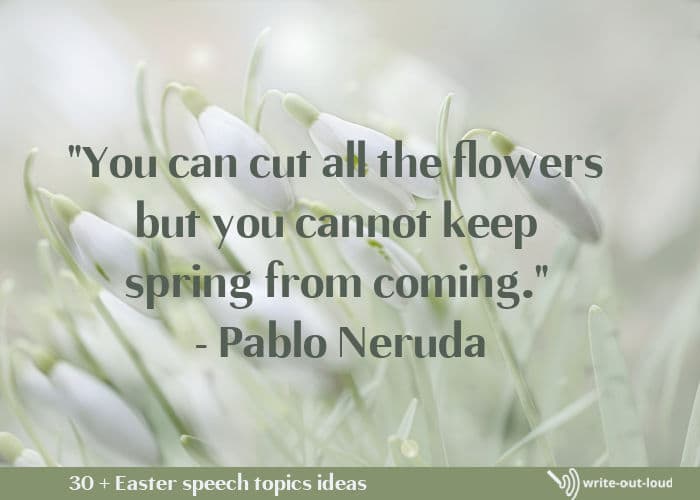
There's a similar theme of Spring being a time renewal but from a Christian perspective in this quotation from Martin Luther, the German priest and theologian whose work and teachings sparked the Protestant Reformation 500 years ago.
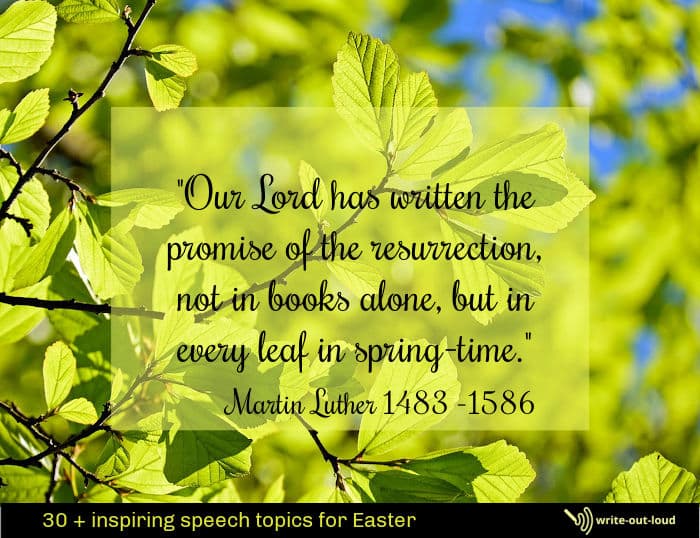
To get you started, here's a collection of Easter themed quotations - some funny, some secular and some religious.
And here's another: Quotes for Easter which celebrates the resurrection of Jesus in the Christian tradition.
11.What curious beliefs are there around Easter?
For instance: bread or buns baked on Good Friday are said to never go moldy. You can read more about that here: 5 Great Historical Myths and Traditions About Hot Cross Buns, a Pre-Easter Pastry.
There are other fascinating beliefs too! The buns are just a beginning.
12.What is the history of the Easter bonnet?
What is the story behind those fabulous creations of flowers and other whimsical masterpieces people wear on their heads for the annual Easter Parade down 5th Avenue in New York City?

The question is answered in this article: The tradition of Easter bonnets explained. It's a great story! The beginning goes back much, much further than the parade.
13.Easter around the world
Embark on a global journey to explore how different cultures celebrate Easter. Compare and contrast traditions, foods, and customs in various countries, highlighting unique regional variations.
For example, what happens in Greece, Italy, France, Russia, UK, or USA to mark Easter?
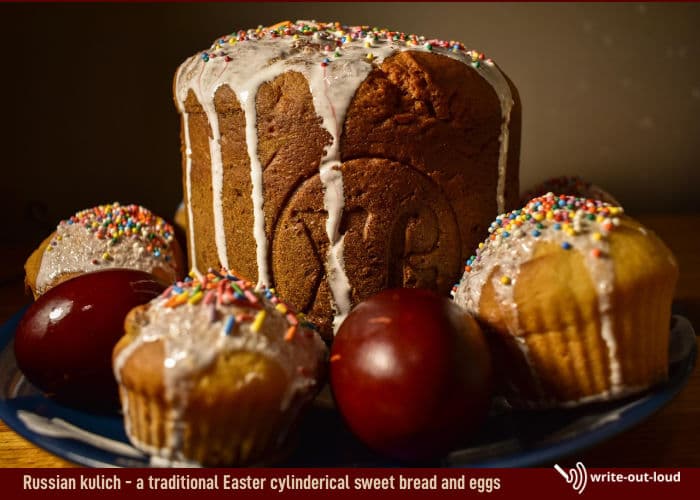
What specials foods are eaten? Are there parades? Are there traditional rites of any sort, like for instance the Polish 'Wet Monday' tradition of men showering water over young women? What are the differences between how your home country celebrates Easter and another?
This is a huge topic - far too big to tackle in one speech. Break it down. Find an aspect that interests you to focus on.
Start with this collection of fabulous photos published in 2018 by guardian.com: Easter around the world in pictures, then explore this article, with pictures, outlining 11 Easter Traditions Around the World | Reader's Digest Canada.
What about one of these egg-themed Easter topics?
Eggs and Easter. They go together like Christmas and trees and birthdays and cake.
Why? Because the egg is an ancient symbol of new life representing the reawakening of nature in spring. Then with the spread of Christianity it also came to represent Jesus' emergence from the tomb and resurrection.
Eggs have been the focal point of many customary Easter activities around the world.
Here are some that would make really interesting topics for a speech.
14.Easter egg rolling - Aside from the White House, where else does this regularly occur as part of Easter, and why?
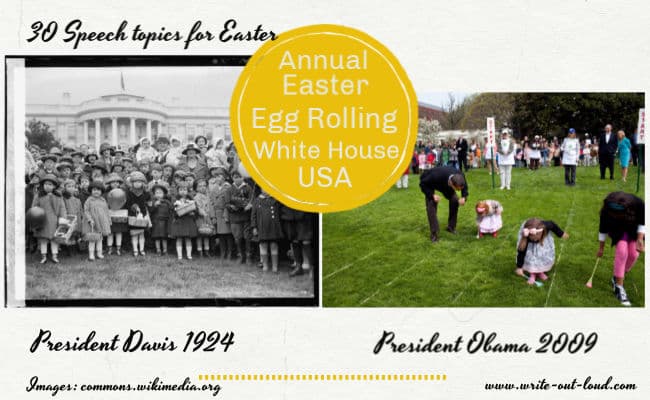
From the White House lawn to local parks, explore the history and traditions of Easter egg rolling. Discuss its origins, variations, and the playful competition it inspires.
Here's a wikipedia.org page to begin with: Egg rolling.
15. Easter egg tapping
Easter egg tapping is also known as egg jarping, egg picking, knocking, boxing or chucking. It's a game where the ends of hand-held hard-boiled eggs are hit together.
Where is it played as part of Easter and what's the history behind it?
Read this delightful article How to Win at Greek Egg Tapping to find out more. Apparently, it can get very competitive and some people even cheat!
16.The Egg dance - a dance celebrating the return of life
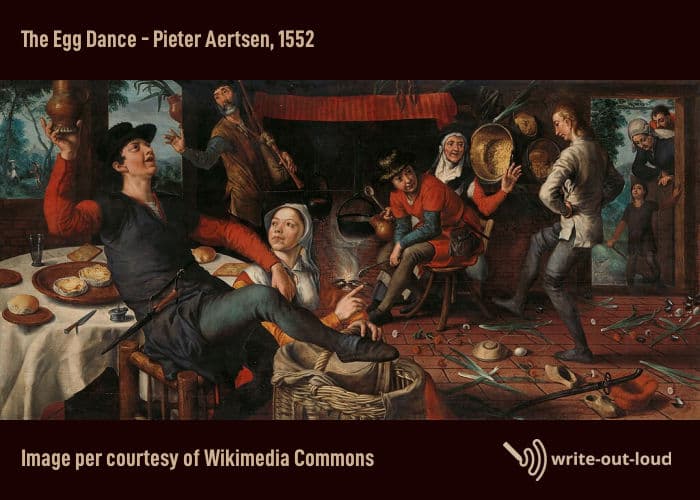
Yes, there are dances dedicated to eggs. They were part of early pagan spring celebrations and have been absorbed into ones for Easter.
An example is depicted in the centuries old Dutch painting above. The young man on the left has used his feet to roll an egg out of a bowl. Now he has to flip the bowl, with his feet, to cover the egg without touching the other objects placed on the floor!
What is the symbolism of the balance and dexterity the dance demands?
The term, egg dance, has also been used to describe the delicate maneuvering that happens between powerful political figures when they are trying to avoid upsetting each other. One misstep could shatter everything.
The Egg Dance: From Peasant Village to Political Caricature provides an excellent overview of the dance's evolution, along with many more images. Wikipedia is another source of good information.
17.Pace Egg Easter plays
These fascinating plays were once performed throughout the United Kingdom. Nowadays they are mostly found in the North of England. They have stock characters: heroes and villains, a plot that involves resurrection and take place either on the street, or in a pub. Audience participation, (booing and hissing), is actively encouraged!
Check the story of the Middleton Pace Egg Play for more. Read the script. Maybe you could pull together a band of jolly 'Pace Eggers' and adapt the play for your community.
The days of Lent & Easter as topics for speeches
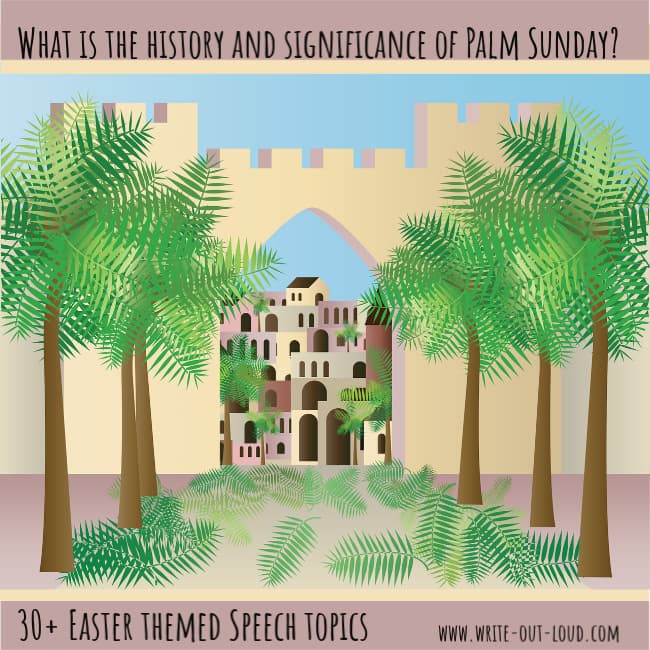
Find out the history of what happens where, when, why and how, on any of the following days.
18.Shrove Tuesday - history and pancake tradition
Shrove Tuesday (sometimes called Fat Tuesday or Mardi Gras)
is the day before the beginning of Lent. It gets its name from the word "shrive" which means to go to church to confess wrongdoings in order to receive a penance and absolution.
It is also associated with making and eating pancakes. Why?
Use this link to begin finding out more: Shrove Tuesday
19.Ash Wednesday: The significance of ashes
Ash Wednesday marks the beginning of Lent. A small cross of ash is put on a person's forehead as a symbol of repentance and as a reminder that we came from dust and will return to dust when we die.
This article provides an excellent overview: Four things to know about Ash Wednesday
20.Mothering Sunday - going home to your 'mother' church
This is not to be confused with Mother's Day. The two celebrations have different origins. Mothering Sunday began as a day, (the fourth Sunday in Lent), when people visited their 'mother' church - either the church where they'd been baptized (thus making them that church's child), or their local parish church. Buns and cakes of varying sorts including Simnel were, and still are, especially made to mark the day.
It is mostly observed in the UK and by countries who have an English colonial background - Canada and Australia.
For more see this wikipedia.org page: Mothering Sunday
21.Palm Sunday - the beginning of Holy Week
Hosanna! Palm Sunday celebrates Jesus entering Jerusalem as Savior and King riding a donkey. People cheered and laid palm branches on the road to honor Him.
Explain the tradition of palm branches and its symbolism.
For more read Debbie McDaniel's piece for crosswalk.com: 5 Things about Palm Sunday That Remind Us Christ Is King
22.Maundy Thursday: The Last Supper
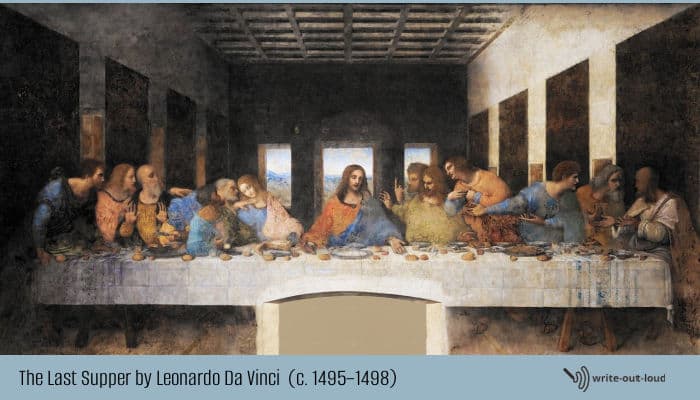
Maundy Thursday is the day 'The Last Supper' is celebrated. Its name, 'Maundy' is Latin for the word 'command'. At that final meal Jesus issued several commands he wanted his disciples and friends to follow.
You can begin finding out more about it, including the ritual of foot washing, here: What is Maundy Thursday / Holy Thursday?
(Be sure to look up 'Maundy money' to find out about a fascinating ongoing British/UK tradition involving the monarchy and especially minted coins. That's a potential topic too!)
23.Good Friday - a day of mourning and reflection
Good Friday is one of the most important in the Christian calendar: the day commemorating the suffering and death of Jesus.
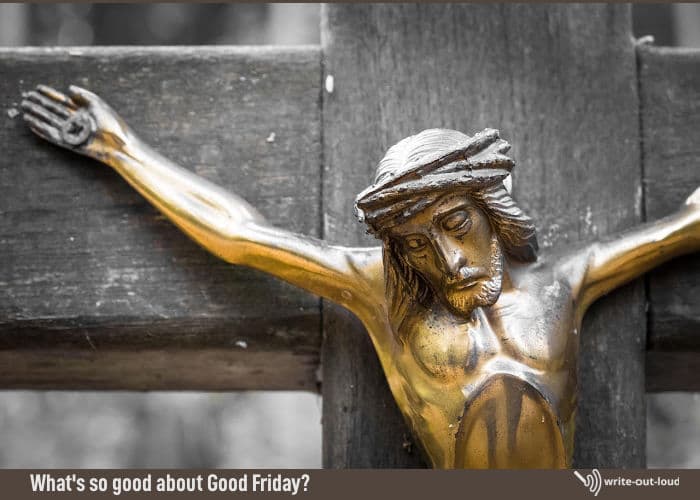
As a child I was puzzled about this day being called 'good'. From my eight-year-old point of view, it was nonsensical. How could being crucified be pleasant? Later I learned that the word 'good' in Old English was the equivalent of the word 'holy'.
Try this link as a starting point: What’s So Good about Good Friday?
24.Holy Saturday - a day of rest, a time of waiting
This day is said to be the day Jesus 'rested'. After His ordeal His body was placed in a tomb 'resting' prior to His resurrection.
Explore the quiet anticipation of Holy Saturday, the day between Good Friday and Easter Sunday. Discuss its liturgical significance and the themes of waiting and hope.
For more see the article: What is Holy Saturday?
25.Easter Sunday - He rises! The celebration of resurrection
Jesus lives! Easter Sunday celebrates Jesus rising from death - His resurrection on the third day after his crucifixion.
Discuss the joyous celebration of Easter Sunday, the culmination of Lent and the central event in the Christian calendar. Explore the themes of resurrection, new life, and the triumph of good over evil.
Here's a good starting place to find out more: Easter Sunday*
* This is an excellent site for children to learn about Easter.
How about "show and tell, share and EAT", Easter speeches?
These topics cover traditional Easter foods. I know they would make very popular demonstration speeches!
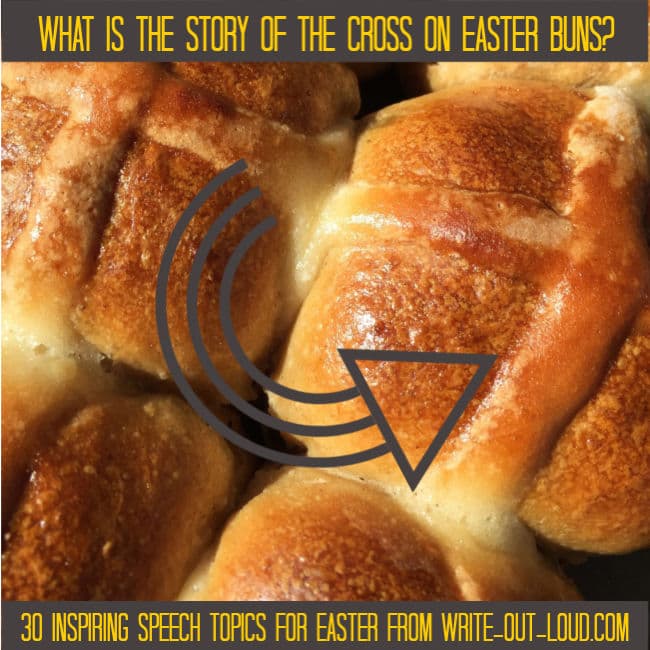
26.Hot cross buns: history and baking
Uncover the history and traditions surrounding hot cross buns, a beloved Easter treat. Share a recipe and demonstrate how to make these spiced buns, explaining the symbolism of the cross.
27.Share the history of Simnel Cake: a Mothering Sunday tradition
This rich fruit cake covered with marzipan and topped with 11 marzipan balls representing the faithful disciples of Jesus is made for Mothering Sunday in the UK.
Look and you'll find recipes and pictures. Here's a recipe to start you off from the BBC: Easter Simnel Cake
28.Why are pancakes traditionally made and eaten on Shrove Tuesday?
Research the story. Find a recipe. Make the pancakes to share alongside talking about their background.
Be sure to read this article on 'Pancake Races' too. It's wild, wacky and 'very British' fun!
29.Make a special Easter bread
Many countries have special Easter breads. Discuss their ingredients, symbolism and baking traditions.
Try Greek 'tsoureki' Easter bread with traditional, red-dyed Easter eggs inserted into it.
Or 'kulich', (Russian), - a sweet, cylindrical shaped, yeast-risen bread with raisins, almonds and candied orange peel.
Consider baking and sharing a chosen bread with your audience.
30.How to make and decorate Easter eggs
Wax, dye, paint, scrape, scratch or glue and glitter? Boiled or blown eggs? Real or substitute?
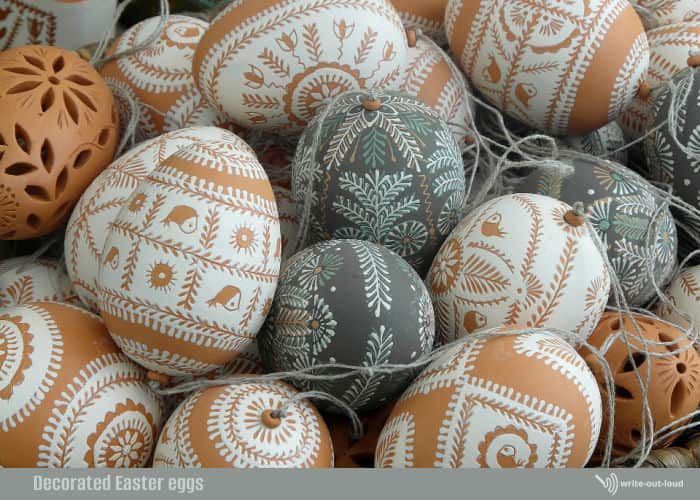
There are many so different ways to decorate an egg! The eggs in the photo above have been scraped or scratched. For simplicity select one method to work into a demonstration speech.
31.How to make an Easter basket
Search and you'll find a squillion suggestions about how to make an Easter basket. There'll be ones in paper bags, ones in buckets, flower baskets, chocolate baskets...
Find one that means something to you; a basket you'd feel happy to make and go for it.
In addition to crafting one, explore the tradition of Easter baskets and their role in gift-giving and celebrations.
32.What's the history of chocolate Easter eggs, and how are they made?
This topic is for you chocophiles, those who cannot ever say no to chocolate.
When did chocolate became a major part of celebrating Easter? What is the cultural significance of chocolate eggs? Who makes the best ones? How?
Visit this Wikipedia page for 40+ more traditional Easter food suggestions: many with ongoing links. (Truly delicious calorie-free browsing! ☺)
Helpful resource pages:
You may find these pages useful once you've chosen a topic.
- How to prepare and give a demonstration speech - if you're considering an 'EAT' or 'show and tell', do check.
- How to use visual aids (props) in speeches - fail-safe tips and tricks to help make sure your speech goes well.
- How to write a speech - if you need a hand with the business of crafting a speech, check this page for step-by-step speech writing help.
Start a conversation - make a comment
What are your favorite Easter traditions? Your thoughts and ideas are welcome!

The link will take you to my 'About me' page where you'll find a contact form to use. Please let me know you're commenting in response to this page on Easter speech topics. I promise I'll respond as promptly as I can. I look forward to hearing from you.

About the Author: Susan Dugdale, founder of write-out-loud.com, is a qualified teacher of English and drama with over 40 years of experience. Drawing on her professional expertise and her personal journey from shyness to confidence, Susan creates practical, real-world resources to help people find their voice and speak with power.

